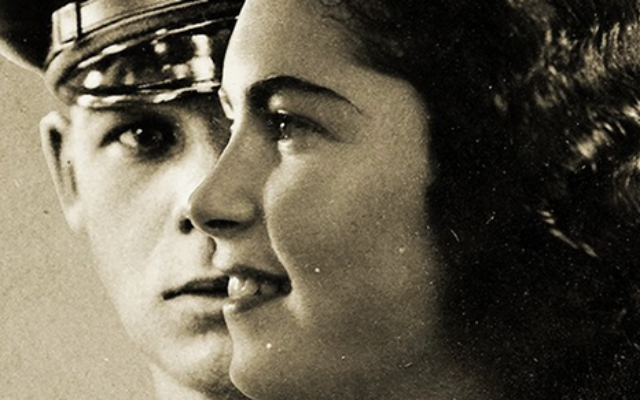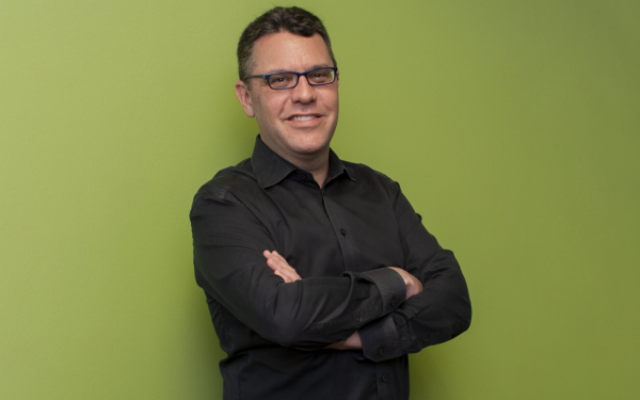AJFF Stresses Quality in Year of Change
Executive Director Kenny Blank strives to reinvest in the Atlanta Jewish Film Festival.
As if to underscore a year of profound change, the Atlanta Jewish Film Festival wound up its 21st year by presenting its Human Rights Jury Prize March 10 not to an Israeli film but to a Palestinian one, made without any financial assistance from Israel’s government or Israel’s media companies.
The film was “200 Meters.” It told the dramatic story of the difficulties a Palestinian construction worker and father on the West Bank faces as he attempts to maintain a relationship with his mother who lives in Israel.
Like most of its programming this year the award ceremony was virtual. It played to an empty house from the stage at the Sandy Springs Performing Arts Center. There was no applause and no fanfare, and the credits rolled over pictures of a largely deserted stage.
In this year of the pandemic the presentations announcing the AJFF prizes were viwed by audiences via just another electronic screen that brought the winners into living rooms across Atlanta, though they may have actually been speaking from continents away.
The Palestinian film, too, dwells on how distances are calculated in a world of change. Different generations of a Palestinian family live only 200 meters (219 yards) from each other but are separated by the wall that Israel has built along its border and the territories on the West Bank, and by the bureaucratic obstacles that have been erected between them.
In his brief comments accepting the award, director Ameen Nayfeh pointedly emphasized that he was speaking from Palestine.
“It meant a lot to me to participate in this festival,” he said, expressing hope that “this will also help the film to be seen by more people in the United States and everywhere around the world.”
The film is Jordan’s official entry in this year’s Academy Award for best foreign film. It previously won the People’s Choice Award at the prestigious Venice Film Festival
With the festival over, the long-serving executive director of the event, Kenny Blank, was generally happy with the result.
“I think all these pieces of the festival, whether it was the virtual cinema, the drive-in and the expanded Q&As, the virtual lobby conversations, they all had a crucial part to play in not just recreating the festival experience, but actually introducing some new innovations that I hope will stay with us in future editions of the festival.”
If there was anything to be learned from the dramatic changes at this year’s festival, it is that there is no going back, Blank said.
“I think that nothing is sacred, that we have to be prepared as an organization to reinvent ourselves, to think outside the box, to let go of maybe some of the traditions and the way things were done in the past.”

The biggest award winner at the AJFF was “Here We Are,” a sensitive film about the relationship between a father and his autistic son.
“Here We Are” was named best narrative film by a three-judge panel and also won top honors in the same category as the Audience Award film, which is based on the votes of festival ticketholders.
The jury award was presented by Diane Baker, the distinguished Hollywood actress whose long career in films and on television began with the 1959 film, “The Diary of Anne Frank,” where she played Anne Frank’s sister Margot.
She described “Here We Are” as a film which “shows how a universe of meaning can be packed into a single relationship.”
“Here We Are” last year was nominated for Best Feature Film at the Israeli Ophir Awards, the country’s top film prize, as well as nominations in eight other categories. It was also among Israel’s official entries in the Cannes Film Festival.
Director Nir Bergman, in brief remarks from Israel, thanked the festival for the recognition and said he hoped “it will help other people to hear about the film. And we wish that as many people as possible in America will see the film.”
Bergman is perhaps best known to American audiences as one of the creators of what became the HBO hit series “In Treatment.”
Taking home the award for best documentary was another film by an Israeli, “Love It Was Not.”
The film’s director Maya Sarfaty scoured film archives to piece together the astonishing story of a romance between a Nazi SS officer and a young Jewish woman that takes place literally within the shadows of the crematoria in Auschwitz, the German concentration camp.
The award was presented by Nancy Spielberg, sister of Steven Spielberg, the famed Hollywood director. Her film “Picture of His Life” was nominated for best documentary at last year’s AJFF.

She described “Love It Was Not” as “a universal story that echoes some of the deepest ethical complexities of the Torah: Who should live and who should die. This is not the kind of Holocaust story that we even imagined could exist.”
Other jury prize winners at the AJFF this year were Johanne Helgeland for “The Crossing,” which won the Emerging Filmmaker prize; “The Sublet,” which was named as the Building Bridges winner; and “I Am Here” for Audience Award documentary.
Honorees in the short film category were “Masel Tov Cocktail” for fictional short and “Space Torah” for Audience Award short.
This year’s festival, where 38 films and 12 shorts were screened, was considerably shorter than in recent years.
Still Blank, the AJFF executive director, had nothing but praise for the high caliber of the winning films. It was proof, he emphasized, that as much as things have changed this year, the standards that audiences have come to expect from the event remain the same.
“It really demonstrates that the cinematic tradition remains very much alive, as vital and robust as ever,” he said. “And that’s despite the challenges brought on by this pandemic.”




comments